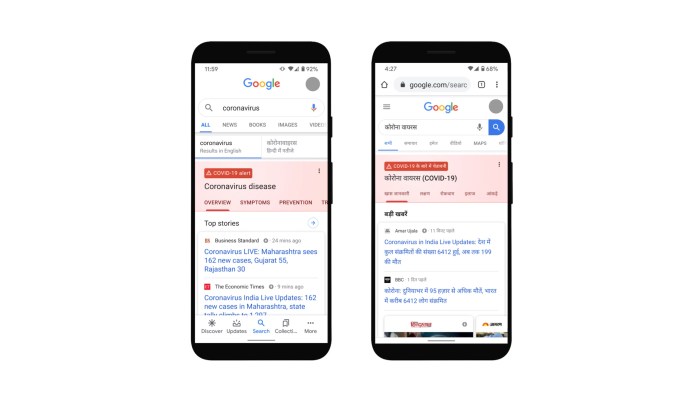Google has launched a website dedicated to coronavirus updates in India and tweaked its search engine and YouTube to prominently display authoritative information and locally relevant details about the pandemic from the nation’s Ministry of Health and Family Welfare, the company said on Monday.
Additionally, Google is also showing more than 1,500 food and night shelters in about three dozen cities in India on Google Maps and Search to guide people in need, it said. Millions of migrant daily-wage workers in India recently started to head to their home towns as their work disappeared after New Delhi ordered a 21-day lockdown across the nation last month to fight the spread of the infectious disease.
People can also find these locations by also asking Google Assistant about “food shelters,” for instance, in English and Hindi. Assistant is available to users on smartphones, KaiOS-powered feature phones and through a Vodafone-Idea phone line. (The company said it is working on supporting additional Indian languages.)

The Mountain View-headquartered giant, which counts India among its key overseas markets, said it has published COVID-19 Community Mobility Reports to help health officials in the country in their decision-making. The reports capture how traffic and movement across public places such as parks, transit stations and grocery stores have changed in the country in recent weeks.
On Maps, Google has also introduced Nearby Spot on Maps to help people in the nation find local stores that are providing essential items such as groceries.
YouTube and Search are showing consolidated information including the top news stories, links to MoHFW resources, and other authoritative content on symptoms, prevention, and treatments, Google said. YouTube has additionally also launched a ‘Coronavirus News Shelf,’ featured atop the homepage, that provides the latest news from authoritative media outlets regarding the outbreak.
In recent weeks, Google’s Pay service, as well as Walmart’s PhonePe and Paytm, introduced simplified ways to donate to Indian Prime Minister Narendra Modi’s fund to fight the coronavirus. Google said people have used its payments service to donate north of $13 million to date.
These steps should help contain another outbreak that India has been grappling with for several years: False information. Messaging services are filled with speculative and false information about why the government is doing what it is doing, who is spreading the infectious disease, or the age-old Indian devised cure for the Covid-19. And more often than not, these hoaxes are presented as facts by select TV news networks that reach hundreds of millions of users.
WhatsApp, the most popular app in India, has also stepped up to inform users about the infectious disease.

